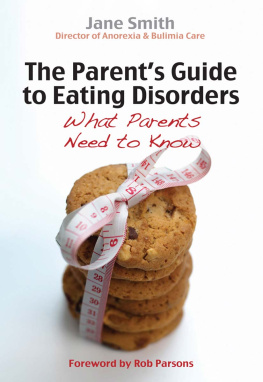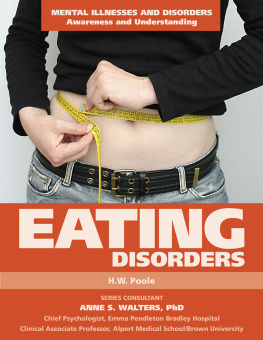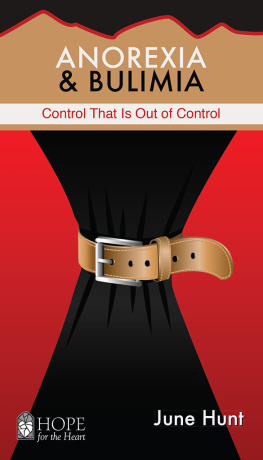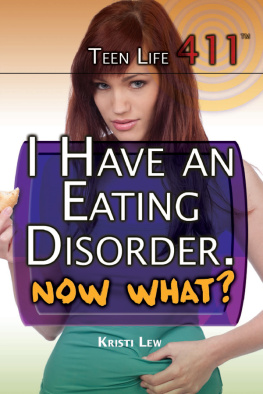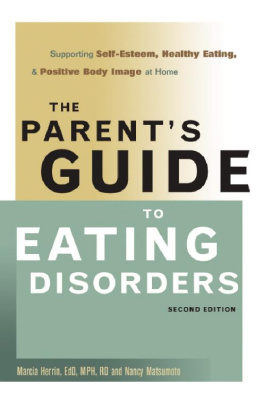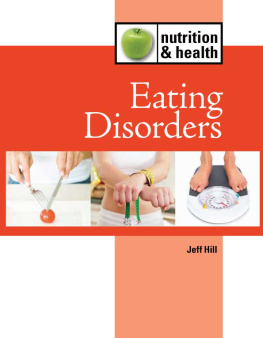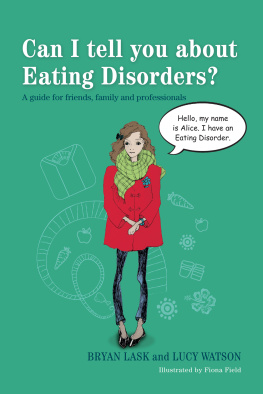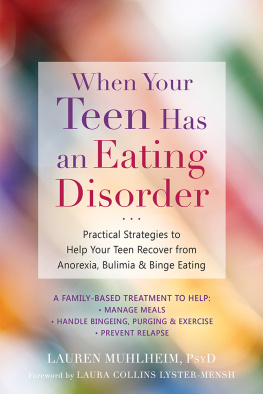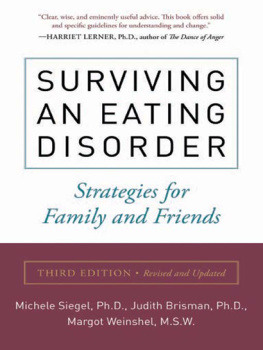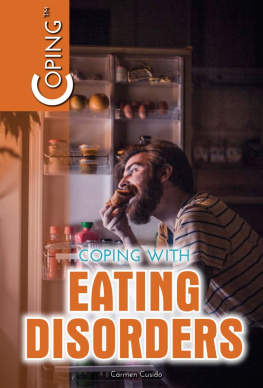Acknowledgments
Id like to thank all the parent contributors who have made this book one of such personal insight by being so willing to share their stories and recall their emotions. Im very grateful to Rob Parsons, Mark Molden, and Sheron Rice, and all the staff at Care for the Family for their support and to the staff, trustees, and medical advisors at ABC, notably Dr Dee Dawson, Jackie Disbury, and Nicola Rance. I couldnt have done without the support, advice, and good practice of Dr Matthew Dolman and Dr Ros King. Many thanks also go to David Moloney, Kate Kirkpatrick, Miranda Lever, Jessica Tinker, and Leisa Nugent at Lion Hudson for their wisdom and expertise.
Foreword
I have no doubt at all that having a child with an eating disorder is one of the most frightening and traumatic experiences a parent can go through. Often parents dont know how to begin to deal with the situation or where to turn for help or advice. Thats why I count it a privilege to write the foreword to The Parents Guide to Eating Disorders as it offers much-needed encouragement, hope, and advice to parents in this situation. In fact, it will be a help to anyone who is concerned for somebody they love who is suffering with this illness husbands, wives, brothers, sisters, friends.
Jane Smith is the Director of Anorexia and Bulimia Care (ABC), one of two national organizations caring for those with eating disorders. The expertise and understanding she has gained through her years of advising and supporting parents is evident throughout this book. But it is not just a book written by the experts Jane writes with the heart and compassion of a mother who has herself experienced the challenge and pain of seeing two of her own daughters through anorexia and bulimia, and also from the experience she has gained over the years working at the helpline.
Since Care for the Family began over twenty years ago, the number of calls we receive from parents of children with an eating disorder has spiralled. I believe it is vital for these parents to know that they are not alone and I am thrilled that just recently we were able to join forces with ABC to establish a telephone befriending service for parents. This service will allow parents to speak, in confidence, to another parent who has had a similar experience. It is not counselling, but an opportunity to share your story and be supported on a regular basis by someone who truly understands what you are going through.
Eating disorders cant be cured overnight indeed, the road to healing is often long and hard. And thats why this book was written. The Parents Guide to Eating Disorders offers parents understanding, practical suggestions, guidance, and real hope as they support those they love along that road to a better future.
Rob Parsons
Chairman and Founder of Care for the Family
About ABCs Parent Helpline
ABC is a UK organization that has been helping people with eating disorders and related self-harm for more than twenty years. I joined ABC in 2004 in order to run their parent helpline, and since then it has received calls from thousands of parents who have been loving and supporting their children of varying ages through an eating disorder. Parents phone at various stages: at the outset of the illness; in the days of suspicion and worry beforehand; through the wait for treatment; or through treatment itself towards recovery. When they call, parents are looking for advice, comfort, and encouragement from people who have been where they are now, and who really understand from their own experience what the caller is going through. The recent establishment of our Befriending Service with Care for the Family enables us to offer even greater on-going support.
The parents who call our helpline want to speak to people who are prepared to listen to their situation and answer their questions. Often they are deeply distressed, worried, and worn out. Most express feelings of being alone and of hopelessness, and have a sense of being unsupported. They want information about what they can expect from their childs illness or from treatment from the NHS, or they want to know about counselling therapy (about the different types of individual therapy available and about group and family therapy).
Whatever their different needs, they all desperately want to share their story, to talk about how they are responding to their childs and familys needs, and to discuss methods they can try to prevent any further harm happening to their son or daughter. Being informed and having suggestions gives hope, and our parents and carers helpline offers ongoing help and hope to anyone who needs it. We hear from mothers and fathers, stepmothers and stepfathers; from brothers, sisters, aunties, grandmas, friends, girlfriends, boyfriends, and teachers who all want to help their particular sufferer.
Some mums and dads are single parents and are trying to cope alone. Some of our callers have their own health problems sometimes serious ones or are already supporting someone in the family with a major illness or disability as well as trying to cope with their childs eating disorder. Sometimes the child with the eating disorder also has additional needs: they may be deaf, for example, or have autism spectrum disorders (ASDs), or else suffer with another long-term illness or condition.
We hear from parents of children aged eleven, twelve, and even younger, as well as teenagers. Many are trying to support an adult son or daughter, which in itself produces specific difficulties as they are often excluded from their childs illness and therefore from any treatment. Irrespective of their different circumstances, all the parents want to understand and to help their children through the terrible ordeal towards full recovery, as well as to find a little relief from the overwhelming fear, sadness, and isolation that they experience.
Introduction
This is a book written for parents by parents in order to help you as much as possible as you support someone you love through an eating disorder and into recovery. It aims to give you some practical tips and strategies as well as insight and information, and also to reassure you that you are not alone.
During my time working at ABCs parent helpline, I have received calls from across the UK and also from abroad from people in all walks of life: mums and dads at home and mums and dads at work; parents who are social workers, educational psychologists, teachers, doctors, vicars, nurses, and counsellors as well as those in business. Some of them have willingly offered their experiences in answer to the questions posed in this book. These questions constitute some of those most frequently asked at ABC, although, of course, it is not possible to include everything. Although your experience may not fit exactly with the scenarios that our parents have outlined, I would encourage you to read all the questions and answers in each chapter because there is a wealth of information and experience contained in them, giving good tips and suggestions that you may be able to apply to your situation.

